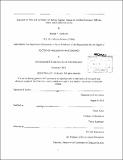Exposure to risk and its impact on human capital : essays on combat exposure, military labor, and conflict duration
Author(s)
Yankovich, Michael F
DownloadFull printable version (18.32Mb)
Alternative title
Essays on combat exposure, military labor, and conflict duration
Other Contributors
Massachusetts Institute of Technology. Department of Economics.
Advisor
David Autor.
Terms of use
Metadata
Show full item recordAbstract
This dissertation examines the impact of contemporaneous American participation in war on military labor and conflict duration. Chapter one uses variation in occupation-specific retention bonuses and mortality risks observed in the U.S. Army during the war on terror to estimate the rate at which volunteers for active military service are willing to trade wealth and risk of death when making reenlistment decisions. Our estimate of the Value of Statistical Life among first-term soldiers is between $0.1M and $0.5M. Bonus policy is an effective tool for meeting near-term military manpower shortages. Increasing the bonus offer by $1,000 leads to an increase in the probability of reenlistment of 1.5 percentage points. Chapter two documents a substantial increase in the post-service one-year mortality rate of recent veterans using estimates constructed by matching Army administrative data to the Social Security Administration's Death Master File. The total mortality of service in the Army between 2001 and 2010 is likely understated by approximately 10% or over 350 deaths. Approximately 91% of the change in post-service mortality is due to the effect of exposure to high rates of mortality while in-service. The relationship between in-service and post-service mortality has likely always existed, but the higher rates of in-service mortality during the war mean that post-service mortality rates are higher. The third chapter provides empirical evidence linking third-party interventions to increases in the duration of intra-state wars. It also reviews several theoretical constructs underlying this correlation, and it adapts the model of the Swing Voter's Curse to provide a novel explanation. Namely, when third-parties intervene in civil wars, local nationals are more likely to abstain from making a commitment to either the government or rebel side as the intervening party serves to cloud perceptions of the latent balance of power between the primary intra-state contenders. The chapter concludes with an analysis of implications for interventionist policies with regard to the war in Afghanistan.
Description
Thesis (Ph. D.)--Massachusetts Institute of Technology, Dept. of Economics, 2013. Cataloged from PDF version of thesis. Includes bibliographical references.
Date issued
2013Department
Massachusetts Institute of Technology. Department of EconomicsPublisher
Massachusetts Institute of Technology
Keywords
Economics.